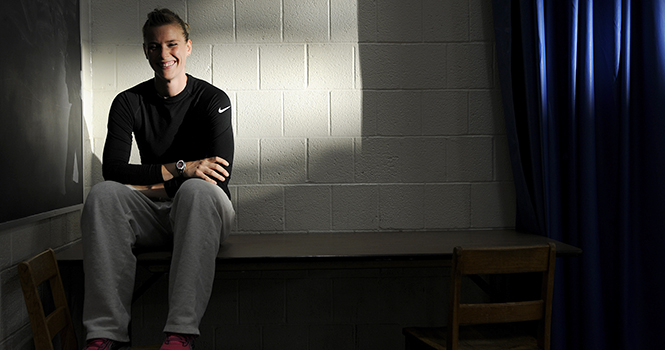Young KSU alumna, instructor celebrates survival during National Breast Cancer Awareness Month
Kirsten Beverley, 28, was diagnosed with breast cancer during her junior year at Kent State. She received radiation and chemotherapy treatments while still enrolled at KSU and is now in remission. Beverley now teaches six physical education classes at Kent. Photo by Hannah Potes
It was the end of her junior year at Kent State, and while her friends were worrying about finding jobs, Kirsten Beverley was worrying about surviving. She was diagnosed with breast cancer when she was 20 years old.
Breast Cancer Facts:
- Breast cancer accounts for one in three cancers diagnosed in women.
- Breast cancer typically produces no symptoms when the tumor is small and most treatable.
- People with the BRCA1 or BRCA2 gene are 50 to 60 percent more likely to develop breast cancer in their lifetimes.
- Breast cancer is more common in people who are African American, obese or who have poor diet or exercise habits.
- Breast cancer is uncommon for women under age 40, but about 5 percent of individuals who have breast cancer are in that age group.
-
Symptoms:
- Lump in the breast or armpit
- Change in skin around the nipple
- Strange discharge coming from the nipple
-
Seeking Help:
- Self breast examinations and mammograms can test for cancer. Mammographies are less accurate for people younger than 40 because they have denser breasts.
- Most physicians and medical professionals advise women to get annual mammograms beginning at age 40, unless they have genetic history of breast cancer.
- Women who are older than 18 should check their breasts at least once a month for lumps.
- Sources: American Cancer Society and Sameer Mahesh, medical oncologist for Summa Health System in Akron and Medina
Though it’s more common later in life, women and men of all ages can develop breast cancer. About 5 percent of breast cancer victims are younger than 40 years old, according to the Susan G. Komen for the Cure website. People who have the BRCA1 or BRCA2 gene, both of which are genetic mutations, are more likely to develop the cancer at a young age.
Beverley, now an instructor in Kent State’s physical education department, discovered her cancer at a late stage. She was an intern for the American Cancer Society in 2005, and she said she felt a weird lump in her breast when she was taking part in a self-breast exam seminar. When she went to get it checked out, the doctors told her she was BRCA1 positive and had stage four breast cancer.
“They told me I had six months to live,” Beverley said. Her doctor suggested dropping out of school to enjoy life, but she said she wouldn’t have any of that.
“That was just not going to happen. If I was going to be here any longer, I was going to do what I wanted to do: go to college and pursue career goals. I wasn’t going to hide and crumble.”
Radiation and chemotherapy during the school year didn’t stop Beverley from going to class and taking on extracurricular activities. Since treatments didn’t drastically change her physical appearance, she said most of her classmates didn’t even know she was fighting cancer. But Beverley still has scars, including a physical scar around her heart from radiation.
“Radiation really rips your body apart,” she said. “The side effects — most people don’t even understand. You might seem healthy at the end [of treatment], but chemo can create added stressors to your body because it kills all cells, not just cancer cells.”
Since beating her cancer, Beverley has been proactive about her health. During fall of her senior year in 2006, she helped launch Cancer for a Cause at Kent State, now called Colleges Against Cancer, which is a group of students, faculty and staff who volunteer for the American Cancer Society.
Beverley graduated with a degree in public relations, and today she works as a Kent State fitness instructor, encouraging students to make healthy life choices.
“I’ve fought for and won [back] my health,” Beverley said, adding that her healthier lifestyle gives her a better chance against developing cancer again.
Upcoming Events:
Oct. 19: National Mammography Day
Oct. 22 – Oct. 26: Paint The Campus Pink Week at Kent State
Contact Megan Wilkinson at [email protected].



